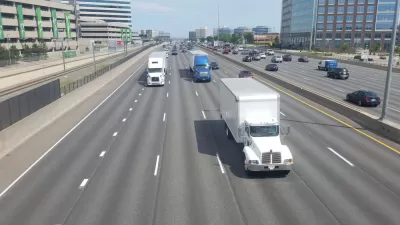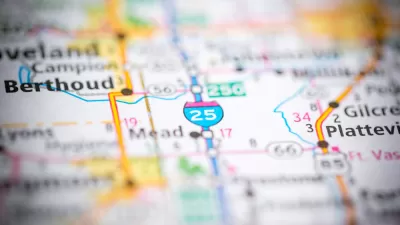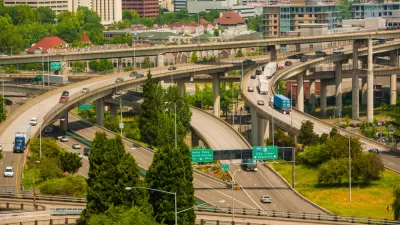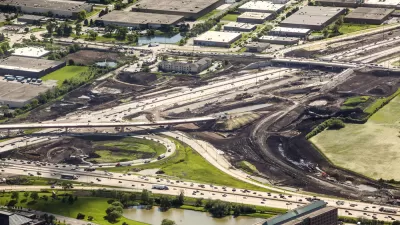The Colorado Department of Transportation has plans to expand highways, but it also has a mandate to reduce emissions from the state's transportation systems. Is it possible to do both?

The state of Colorado is searching for ways to reconcile two potentially conflicting goals: expanding its highways at the request of commuters and industry, while also reducing greenhouse gas emissions 90 percent by 2050.
An article by Nathaniel Minor details the crossroads of transportation planning facing the state. Summarizing the potential conflict thusly:
The Colorado Department of Transportation has plans to rebuild and expand Interstate 270 in the next 10 years. But department officials say they have shifted from expanding highways as quickly as money allows to a “fix it first” approach, mixed with expanding transit and pedestrian infrastructure.
According to Minor, the state has two strategies for reducing vehicle miles traveled and lessening the need for new and wider highways in the state.
The first, currently in the works at the Colorado Department of Public Health and Environment, would require large employers in the Denver metro and the northern Front Range to develop plans that reduce the number of workers who drive to work alone. Suggested strategies include incentivizing public transit use, carpooling and working from home.
The second could shape the type of transportation projects that are built. It would require the state to create emissions budgets that CDOT and metropolitan planning organizations like the Denver Regional Council of Governments would have to meet.
Much of the Colorado Department of Transportation's current planning and engineering work is dictated by a $5 billion, ten-year transportation "strategic project pipeline" approved in 2020. Will Toor, executive director of the Colorado Energy Office, is quoted in the article saying that the ten-year plan reflects a shift in planning philosophy for the state.
Minor shares Toor's insights: "The few highway expansions in CDOT’s current plan take a 'far more thoughtful approach' than previous incarnations, Toor said. Overall, he said, the plan strikes a more environmentally friendly balance between maintenance and expansion."
Specifics on that thoughtful approach are included in the source article, along with more insight into future planning efforts that could determine the success of Colorado's emissions reductions goals. Minor also provides insight into the political debate surrounding the state's efforts to reconcile highway spending with emission reduction goals. Environmentalists, for example, aren’t convinced the state is doing enough to remove emissions from the state's transportation systems.

Montreal Mall to Become 6,000 Housing Units
Place Versailles will be transformed into a mixed-use complex over the next 25 years.

Planetizen Federal Action Tracker
A weekly monitor of how Trump’s orders and actions are impacting planners and planning in America.

Four Reasons Urban Planners Can’t Ignore AI
It’s no longer a question of whether AI will shape planning, but how. That how is up to us.

High Housing Costs Driving Down Transit Ridership in LA
When neighborhoods gentrify and displace lower-income residents, transit ridership suffers, new research shows.

Iowa Legalizes Accessory Dwelling Units
A new law will allow property owners to build ADUs on single-family lots starting on July 1.

NYC Council Approves Brooklyn Rezoning Plan
The Atlantic Avenue Mixed Use Plan includes infrastructure investments and could bring 4,600 new housing units to parts of Brooklyn.
Urban Design for Planners 1: Software Tools
This six-course series explores essential urban design concepts using open source software and equips planners with the tools they need to participate fully in the urban design process.
Planning for Universal Design
Learn the tools for implementing Universal Design in planning regulations.
City of Camden Redevelopment Agency
City of Astoria
Transportation Research & Education Center (TREC) at Portland State University
City of Camden Redevelopment Agency
Municipality of Princeton (NJ)
Regional Transportation Commission of Southern Nevada





























